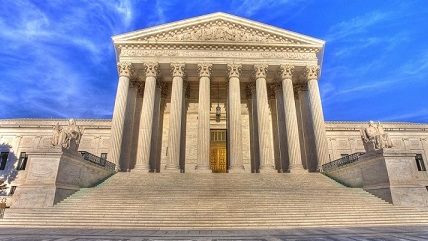Supreme Court Delivers Bitter Pill on Religious Liberty
Court refuses to hear case about Washington laws that allows pharmacists all kinds of exemptions, except ones that are matters of conscience.

Should a pharmacy whose owners have moral objections to the death penalty be required to provide execution drugs? The liberal justices of the Supreme Court apparently think so.
In one of its last orders of the term, the high court refused to hear a case brought by a family-owned drugstore in Washington state.
The Stormans, who own Ralph's Thriftway, object to state regulations that force pharmacies to dispense certain drugs. A federal district court ruled in their favor, but the 9th Circuit Court of Appeals overturned it. The Stormans asked the Supreme Court to hear their case, but the four liberal justices refused.
Justice Samuel Alito wrote an irrefutable dissent, which fellow conservative justices John Roberts and Clarence Thomas joined. Alito makes it painfully clear that Washington's rules amount to blatant religious discrimination.
Under those rules, pharmacies can cite any number of nonreligious reasons for not stocking certain drugs. A pharmacy can decline to stock a drug if it requires extra paperwork. Or if it has a short shelf life. Or if it might attract crime. Or if the pharmacy serves a niche customer base (such as diabetics) and the drug does not.
A pharmacy can even refuse to provide a drug—even a drug it regularly stocks—if it does not accept Medicaid, Medicare, or a patient's insurance. As Alito notes, this means the drugstore can refuse to provide certain patients with any drugs at all.
But under Washington's rules, the one basis a pharmacy can never cite for refusing to provide a drug is "because its owner objects to delivery on religious, moral, or other personal grounds."
As the evidence from the case makes clear, this was not just an effect of the regulations, but the entire point. The executive director of the state health board said its task was "to draft language" permitting exemptions for "legitimate" reasons—which he explained meant "non-moral or non-religious reasons"—and excluding those based on conscience.
To compound the inanity, the regulations have to do with what is called "facilitated referral." In other words, they govern when it is acceptable for Pharmacy X to tell someone, "Sorry, we don't provide that drug, but Pharmacy Y across the street does, and they'll be happy to fill your prescription." Pharmacies do this constantly, because it is impossible for every pharmacy to stock every one of the thousands of drugs available by prescription.
In the case of Ralph's Thriftway, Alito notes, the drugs at issue "are stocked by more than 30 other pharmacies within five miles of Ralph's." Nevertheless, Washington regulators insisted that Ralph's also stock the drugs rather than refer customers elsewhere.
At this point it should be noted that the drugs in this particular case are not execution drugs. The dispute actually concerned emergency contraceptives such as Plan B. That made objecting pharmacies the target of hostility from pro-abortion groups. As the district court noted, such groups carried out an "active campaign … to seek out pharmacies and pharmacists with religious objections to Plan B and to file complaints" with the state. A third of all the complaints concerned Ralph's. Consider this one more proof that liberal homilies about tolerating other viewpoints are little more than a hollow joke.
But the point holds regardless of what sort of drug the state insists a pharmacist carry: Washington allows exemptions for secular reasons, but not for religious ones. Pro-choice groups might object that the analogy is weak because no loss of individual rights is at stake if a pharmacy does not stock an execution drug. But as the preceding makes clear, no loss of individual rights is at stake if a pharmacy does not stock emergency contraception, either—because the drug is readily available elsewhere, and Ralph's was perfectly willing to refer customers to those other stores.
Insisting that Ralph's refusal to stock emergency contraception violates a woman's right to choose is equivalent to saying that Target violates a woman's right to buy a gun because it doesn't sell firearms.
Washington's rules do allow a conscience exemption for individual pharmacists. But they require drugstores to have on duty a pharmacist who does not object to emergency contraception. This effectively renders pharmacists with religious objections unemployable, since no drugstore is going to pay for two on-duty pharmacists when one will do. The narrow exception also offers no relief for drugstores that are individually or family-owned.
In refusing to hear the Stormans' case, the Supreme Court has given states a green light to practice what the district court called a "religious gerrymander": They can single out deeply felt religious scruples as unworthy of consideration even while they accede to far less important objections, such as added paperwork.
Alito calls the decision "an ominous sign." He's absolutely right.
This column originally appeared at the Richmond Times-Dispatch.


Show Comments (128)